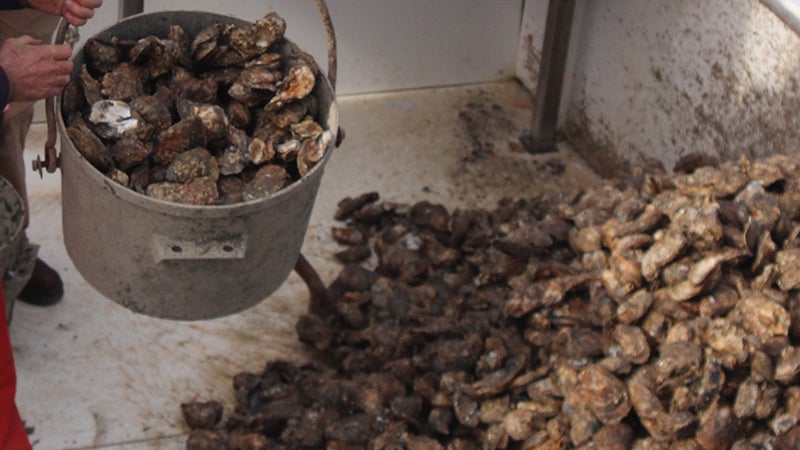State Supreme Court rules in favor of city, HRSD in oyster case
Published 1:38 pm Thursday, December 10, 2020

- The Virginia Supreme Court has affirmed a Suffolk Circuit Court decision to dismiss an inverse condemnation claim by local oystermen against the city of Suffolk and the Hampton Roads Sanitation District. File photo.
|
Getting your Trinity Audio player ready...
|
The Virginia Supreme Court has affirmed a Suffolk Circuit Court decision to dismiss an inverse condemnation claim by local oystermen against the city of Suffolk and the Hampton Roads Sanitation District.
C. Robert Johnson III, Lisa Lawson Johnson, Thomas Hazelwood, Johnson and Sons Seafood and Hazelwood Oyster Farms filed the original lawsuit in November 2018 when they sued the city and sanitation district.
The local oystermen had alleged that the city allowed untreated stormwater and sewage to be released into the Nansemond River, and with the sanitation district doing the same periodically with untreated sewage, the government took their property in a manner that caused the river to be polluted and prevented them from harvesting oysters from the grounds where they hold leases.
The state Supreme Court heard arguments Nov. 4, and it held the potential for far-reaching, precedent-setting implications as it merged environmental case law and case law about inverse condemnation — the taking of private property for a public purpose without properly compensating its owner.
An attorney for the oystermen, Steve Emmert, said during arguments before the Supreme Court that the case was one of physical invasion, not a regulatory taking case.
In the 1919 opinion, Darling v. Newport News, the court looked at oyster-bed claims similar to the ones stated by the Suffolk oystermen. But in the Darling case, Emmert noted that the claims came from the federal Constitution — specifically, the Fourteenth Amendment and the contract clause in it. It did not come from the state constitution, on which the oystermen’s claims are based, and it relied on the Darling case, which predates many current environmental laws and regulations.
And while the Supreme Court noted substantive changes in environmental protections since it decided the Darling case, “none of the sources cited by petitioners … expand the scope of the property rights the petitioners obtained when they were granted a lease to plant oysters in state-owned bottomland,” the opinion by Justice Stephen R. McCullough states.
“The limited rights the petitioners acquire when leasing state-owned bottomlands dooms their takings claim.”
McCullough said in the Darling case, the court dealt with an oyster farmer’s claim for compensation for damages to his oysters caused by the city of Newport News’ sewer system discharges.
“We held that the damage to the oysters was not compensable,” McCullough wrote, “(and) pointed to the limited right of an oyster farmer who holds a lease to grow oysters over public land,” while also noting “the countervailing right of a municipal corporation ‘situated on the arm of the sea, adjacent to tidal waters … to use such waters for the purpose of carrying off its refuse and sewage to the sea, so long as such use does not create a public nuisance.’”
The opinion noted that the U.S. and state constitutions include similar language about private property, that it should not “be taken for public use without just compensation.”
It said a threshold question in any takings case is to determine whether government action has impacted a property interest that can be recognized under the pertinent clauses in both the state and federal constitutions — “in other words, does the plaintiff have an interest that is recognized as a property interest?”
McCullough wrote in his opinion that the oystermen’s leases give them the right to occupy state-owned bottomland and exclude others, the city and HRSD “did not interfere with the petitioners’ rights to be on the leased lands,” and did not remove or destroy the oysters themselves.
The decision also stated that there is a distinction between the water bottoms and the water itself.
“The (oystermen) do not own or control the waters that pass over the leased oyster grounds,” the decision states.
It added: “Nothing under the governing statutes and case law or the leases themselves confers or presupposes a right to grow oysters in conditions free of pollution or guarantee a lessee a commercially viable oyster lease. To the contrary, the governing statutes contemplate the condemnation of polluted growing areas and oysters when sanitary conditions render the oysters unhealthy for human consumption.”
The decision notes that pollution has been an issue for oyster growers for more than 100 years and someone who gets a lease to harvest oysters “assumes the risk that the waters surrounding the leased grounds will be insufficiently pure to permit the direct harvest of shellfish from them.”
“The respondents did not interfere with the limited property rights the petitioners have under the leases,” McCullough wrote in his opinion, “and, therefore, their takings claim fails as a matter of law.”
It further stated that while those who have a lease to harvest oysters can prevent others from physically taking or destroying their oysters or oyster beds, “the right to avoid physical confiscation or destruction of the oysters, however, differs from an asserted right to raise them in favorable environmental conditions.”






